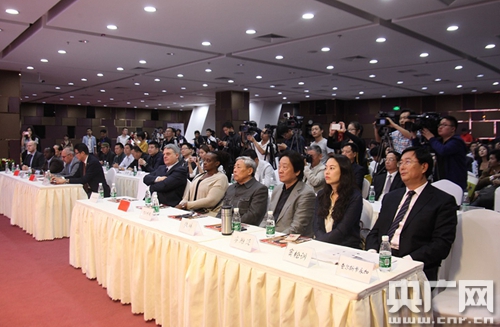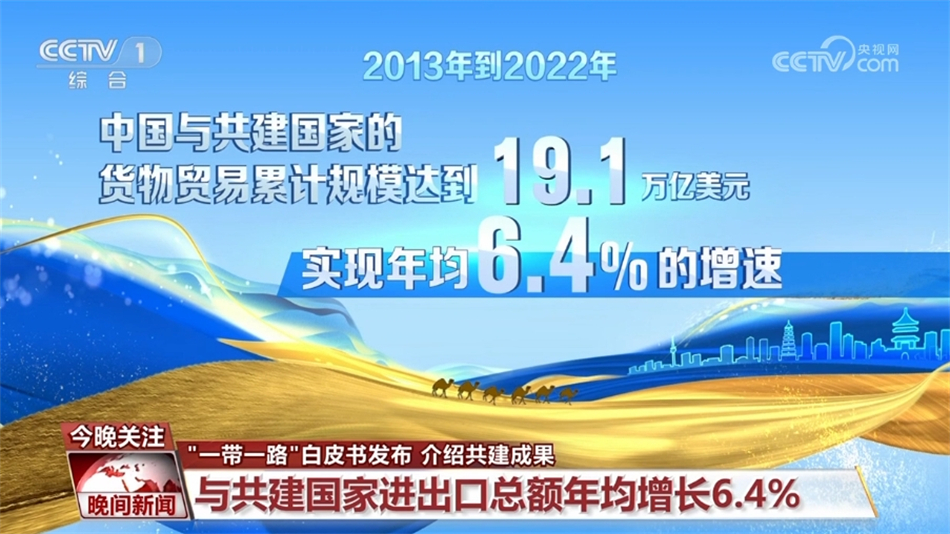Horgos Yilu International Legal District Explores New Path Of Institutional Opening
Horgos Yilu International Legal District Explores New Path Of Institutional Opening
Against this background, the Horgos Yilu International Legal District came into being. By solving legal conflicts, it builds an international commercial dispute resolution hub, explores new paths for institutional opening, optimizes the regional business environment, forms an ecosystem for legal protection, and establishes the international credibility of China's rule of law.
Horgos Yilu International Legal District explores new path of institutional opening
Yang Xinping, Member of the Standing Committee of the Party Committee and Secretary of the Political and Legal Committee of Yili Prefecture, Xinjiang Uygur Autonomous Region, Secretary of the Party Leadership Group and President of the Yili Prefecture Law Society
Liu Guosheng, Dean of the “Belt and Road” Development Research Institute of Yili Normal University and Vice President of the Yili Prefecture Law Society

This is the China-Kazakhstan Connection Channel taken at the China-Kazakhstan Horgos International Border Cooperation Center in Horgos City, Xinjiang on July 26, 2024. Photo by Xinhua News Agency reporter Ding Lei/
At present, the joint construction of the "Belt and Road" has entered a new stage of high-quality development. Economic and trade cooperation among countries along the route has deepened, and the integration of industrial and supply chains has accelerated. Chinese enterprises "going global" face more complex challenges such as standardized operations and dispute settlement, and have higher requirements for foreign-related legal protection systems. Against this background, the Horgos Yilu International Legal District came into being. By solving legal conflicts, it builds an international commercial dispute resolution hub, explores new paths for institutional opening, optimizes the regional business environment, forms an ecosystem for legal protection, and establishes the international credibility of China's rule of law.
National strategic drive and legal logic are self-consistent
Horgos Yilu International Legal District is my country's important foreign-related legal service platform for Central Asia and countries along the "Belt and Road". Based on a profound response to the laws of open development, the nature of market economy and the changes in the international order, it has formed a theoretical system of strategic drive, rule of law innovation and rule reshaping. To address conflicts of rules and dispute resolution issues in cross-border investments by Chinese enterprises, we should build a regional rules system and an efficient dispute resolution mechanism; we should fill in the gaps in commercial practices by formulating guidelines on the application of cross-border trade laws and investment negative lists; innovate the connection procedures of mediation, arbitration and litigation, significantly shorten the dispute handling period and protect land trade; build a three-dimensional protection network of legal risk warning, asset preservation and countermeasures capacity building, and build a legal barrier to maintain national economic security in the hinterland of Central Asia.
Horgos Yilu International Legal District takes the concentration of legal elements and the predictability of rules as its core competitiveness. It has attracted 26 foreign-related legal service institutions such as international law firms, mediation organizations, international arbitration, business consulting, and intellectual property rights, forming a legal service ecosystem covering all fields. In response to the current situation of different laws in Central Asia, the Horgos International Legal District pioneered the "rules coupling method" that integrates substantive rules and connects procedures. Through the three-level leap of practice output, standard generation and discourse control, it promotes the widespread adoption of Chinese arbitration rules in Central Asian commercial contracts. Formulate unified core rules for regional commercial dispute settlement conventions, establish an electronic mutual recognition platform for judgments, and break down enforcement barriers; lead the formulation of a model law for land-based digital trade dispute settlement to fill the gap in international rules, and establish a regional legal coordination mechanism within the framework of the Shanghai Cooperation Organization to realize the role transformation from rule recipient to co-formulator; cross-border patent dispute resolution under professional trial escort will help extend the high-tech industrial chain and realize the transformation from "channel economy" to "rules economy."
The core value of Horgos Yilu International Legal District is to break through the traditional development logic and build a new paradigm of rule of law, security, openness and independent rules. Guide the flow of factors in advance with the supply of rules, balance openness and security with negative lists and compliance reviews, and promote the evolution of international rules with regional practices. Its theoretical value lies in revealing that the rule of law is not only a component of the business environment, but also a country’s strategic ability to participate in global governance.
Institutional innovation and functional construction
The practical exploration of the Horgos Yilu International Legal District is the dialectical unity of institutional innovation and functional breakthroughs, building a legal engine that serves the high-quality development of the “One Belt, One Road” initiative.
Top-level design and institutional innovation to build an open institutional system based on the rule of law. The institutional innovation of the Horgos Yilu International Legal Zone relies on national strategic positioning and local legislative authorization. The "Horgos Yilu International Legal Zone Construction Plan (2024-2030)" and the "China (Xinjiang) Pilot Free Trade Zone Horgos Area Central Asia Legal Service Center Construction Plan" were issued and implemented, laying the foundation for Horgos to build a highland for foreign-related legal rule and providing systematic institutional guarantees for foreign-related legal innovation. Establish a direct reporting channel with the Supreme People's Court to shorten the issuance cycle of cross-border emergency preservation orders and achieve efficient response to emergency rights relief. Procuratorates have created models such as cross-border supervision commitments. The Extraterritorial Law Investigation Center integrates the massive legal resources of Central Asian countries, greatly shortens the investigation cycle, and realizes the transformation from passive inquiry to active supply. Create a one-stop service platform integrating eight major functions, build a full-chain legal service ecosystem, integrate modules such as international commercial trial, arbitration and mediation, and form a service chain covering the entire life cycle of an enterprise. Establish a land trade rules think tank and a Shanghai Cooperation Organization cooperation base to promote research on cutting-edge legal issues and the coordinated evolution of regional rules, and continue to export institutional innovation results. Platform integration upgrades legal services from a single supply to an ecological solution, improves service levels, and provides institutional solutions for the construction of a land trade rule system.
Build core functional modules and create four benchmark systems. The Horgos Yilu International Legal District has innovatively established a hierarchical dispute resolution system, which significantly shortens the dispute resolution cycle through the step-by-step connection of mediation, expedited arbitration and judicial confirmation. Establish an international commercial court to implement a full-process integrated trial model, establish a Central Asia branch in conjunction with the Kazakhstan International Arbitration Center, and integrate the dual rules system. Concentrate high-end foreign-related legal service resources to form an authoritative database covering Central Asian legal materials. Build a three-dimensional framework for risk warning, rule certification and strategic response. Innovate the Chinese and foreign dual certification system and obtain official recognition from the target country. The constructed blockchain evidence chain has been recognized by the judicial institutions of Central Asian countries, laying the foundation for the practice of digital rule of law. Build an education, exchange and rules platform, attract young talents from Central Asia through scholarship projects, build a bridge of legal culture, cultivate regional legal professionals, and create a cross-border practical training system; establish an Asia-Europe Rules Forum and issue an official statement; establish a "Belt and Road" Horgos Rules Forum and issue a declaration.
Achievements, challenges and future prospects
The benchmark value of the Horgos Yilu International Legal District in optimizing the business environment and reshaping the right to speak on rules has initially emerged. However, in the face of in-depth adjustments to the global governance landscape, greater courage is still needed to solve deep-seated challenges and open up a new track for foreign-related legal rule.
Initial results, an empirical anchor for a new benchmark for foreign-related legal rule. The benchmark value of Horgos Yilu International Legal District has been empirically tested. Create a foreign-related legal service platform, adopt the method of "government guidance incubator investment", and introduce international arbitration, foreign-related mediation, foreign-related law firms, international accounting firms, etc., to provide enterprises with comprehensive, professional, one-stop foreign-related legal services. Completed research on common legal differences between China and Kazakhstan with the South Central University for Nationalities, and jointly launched research projects such as the Guidelines for the Protection of Rights and Interests of Chinese Enterprises in Kazakhstan’s Investment and Trade in Kazakhstan, and the Survey Report on the Demand for Foreign Legal Services for Chinese Enterprises’ Investment and Trade in Kazakhstan, jointly with Xinjiang University and Kazakhstan’s Caspian University, laying a literature foundation for the popularization of foreign-related laws, the training of research talents, and the growth of foreign-related legal service institutions. Invite domestic and foreign foreign-related legal practice experts to conduct 4 foreign-related legal training sessions, covering more than 200 companies; participate in the second foreign-related legal forum "Greater Bay Area Foreign-related Rule of Law Construction: Theory and Practice" international seminar and Tahota's second "One Belt, One Road" Legal Service Innovation and Development Forum to explore new paths for the construction of the legal district; hold two foreign-related corporate legal salons to answer legal problems on the spot. The foreign-related legal service system has taken initial shape, and 26 foreign-related legal service institutions have been introduced, including well-known domestic foreign-related law firms, the Central Asian International Arbitration Court, the Asia-Pacific International Arbitration Center, the Hong Kong Arbitration Center, the World Arbitration Center, and the World Commercial Mediation Center, to provide Chinese and foreign business entities with one-stop, diversified legal services and guarantees including legal consultation, foreign-related translation, mediation, litigation, and notarization. The International Court of Arbitration in Central Asia recognized its location advantage and stated that it provides more efficient solutions to cross-border trade disputes. A platform for the collection and transfer of corporate difficulties appeals has been established in an orderly manner, a hotline for collection of corporate difficulties appeals has been opened, the policy and legal service needs faced by enterprises in their operation and development have been collected, think tank resources have been coordinated to solve corporate foreign-related legal issues, administrative law enforcement supervision functions have been embedded, and personalized legal examination services have been provided for enterprises.
Current challenges and bottlenecks, and key targets for deepening reform. Although there is a mutual recognition framework for judgments in the Horgos Yilu International Legal District, there are differences in substantive law. There are conflicts between the laws of Central Asian countries and China in the fields of mineral investment and other fields, forming a policy gap. In terms of procedural rules, some countries have traditional delivery of judicial documents and conservative electronic collaboration. Complex notarization and authentication increase litigation costs. Problems such as long periods of extraterritorial enforcement and loss of effectiveness weaken the authority of the dispute settlement mechanism. There is a shortage of high-end talents, including compound talents who understand Central Asian languages and are proficient in international legal practice, cross-border experts on digital legal rule, and core negotiation talents who are familiar with international rules. This restricts the initiative of regional legal services. The visibility of international brands needs to be improved. Compared with mature institutions, Horgos Yilu International Legal District has gaps in indicators such as the presence of international institutions and the participation of foreign experts. The recognition of international commercial entities is insufficient and the proportion of foreign arbitrators is low, which affects international credibility. The adaptation of legal technology and rules requires coordination. The acceptance of blockchain evidence is low. New legal technology tools are not universally recognized. Cross-border data sovereignty disputes make it difficult to verify evidence chains, resulting in a current situation where technology is advanced and rules lag. Policies need to be implemented in a coordinated manner. Regional cross-border bankruptcy rules are blank, tax preferential details are absent, and visa facilitation has blind spots in coverage. This makes it difficult for multinational companies to exit, realize policy dividends, restrict the cross-border flow of high-end talents, and weaken the ability to absorb international resources.
Looking forward to the future, there is a breakthrough path to create a global hub for foreign-related legal rule. The future development of the Horgos Yilu International Legal District should promote systemic reforms, integrate digital empowerment, regional collaboration and rules guidance, and transform from a regional dispute settlement hub to a source of global governance rules. In the field of digital rule of law, we will build a technology base for cross-border judicial collaboration, establish a legal blockchain alliance with the judicial departments of Central Asian countries, create a judicial chain system, and improve the efficiency and transparency of cross-border dispute handling. Develop smart contract templates that adapt to the Central Asian legal system, promote the implementation of the convention on mutual recognition of cross-border digital evidence, and break down data barriers. In terms of regional coordination, we will deepen the construction of the Central Asian rule of law community, establish a three-dimensional network, open a mutual recognition channel for electronic judgments, establish a transnational joint law enforcement agency, formulate a regional investment protection model law, establish a special court for green energy disputes, and rely on training bases and intelligent platforms to cultivate professional talents and achieve cross-language translation of legal texts. In terms of construction planning, we adhere to the goal of establishing a foothold in Yili, radiating across Central Asia, and building an international highland for the rule of law, and strive to build a preferred location for international commercial dispute resolution in Central Asia, a service base for the integrated development of law and business, and a gathering place for legal science and technology innovation. In terms of optimizing the construction goals, we insist on promoting the construction of the legal district and the business district in an integrated manner, promoting the integrated development of law and business, and ultimately promoting the Horgos Yilu International Legal District to achieve a healthy development pattern of "self-development" as the mainstay and government support as the supplement, and strive to grow into a comprehensive international legal service platform in the northwest region and even Central Asia in 2026. It is committed to building the Horgos Yilu International Legal District into a first-class foreign-related legal service center and brand in the "Silk Road Economic Belt" and strives to reach the domestic leading level in foreign-related legal service capabilities by 2030. The service scope covers the five Central Asian countries and even West Asia, Europe and other regions. The level of integrated development of law and business has been greatly improved, promoting the Horgos area to become a demonstration and leading area for the Xinjiang Free Trade Pilot Zone, and vigorously promoting the high-quality economic and social development of Ili and even Xinjiang.
The construction of the Horgos Yilu International Legal District is an innovative practice of Xi Jinping’s rule of law thought in border governance. It responds to the joint construction of the “One Belt, One Road” initiative. The cross-border data agreement formulated under his leadership has become a regional standard, breaking the monopoly of rule-making power, effectively improving the arbitration options of foreign companies, and demonstrating the appeal of institutional openness.





